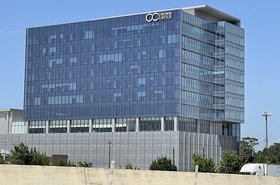European AI cloud company Nebius has increased its projected capex for 2025 by a third.
In the company's Q1 2025 earnings call, the Yandex spin-off revealed that capex for the year was now expected to be around $2 billion, up from previous projections of $1.5bn.
The increase in capex guidance was explained by Nebius' CCO, Tom Blackwell, as being due to “some capex spend that had been planned for late Q4, which actually fell in early Q1,” as well as the company’s strategy of being “opportunistic,” referencing the recently announced project in Israel.
“The Israel data center is one that we haven't initially had in our road map, but it was an opportunity that came along and we thought that was a good one for us to go for,” explained Blackwell.
Announced earlier this month, the Israel contract will see Nebius building and operating a $140m national supercomputer with 4,000 Nvidia Blackwell GPUs, partially funded by the Israeli government's Innovation Authority.
Regarding the company's capex plan, Blackwell added that Nebius is in “quite a unique position among Neoclouds” in terms of how it can “finance future growth.”
“We have significant capital funding potential for the core business, which actually comes from our various ownership and equity stakes of noncore businesses,” explained Blackwell. “And these - the monetization of these potential equity stakes can really translate efficiently into bottom-line results of the core business,” he added, citing an example of Nebius’ 28 percent minority stake in ClickHouse, which could“potentially be a very important source of future capital.”
Blackwell went on to note, indirectly confirming, that “according to some of the recent press reports, there's a fundraising round underway at the moment, which would potentially value the business at around $6 billion,” for ClickHouse. Other companies Nebius has a stake in include Toloka and Avride.
Blackwell clarified that “we would always look to retain significant economic interest in the upside” but that these stakes can provide Nebius with “a very attractive source of financing.”
Nebius, Blackwell later added, will also have “access to more traditional funding sources, and we will look at those from time to time,” with the company previously having secured $700m in equity funding.
In December 2024, Nebius secured $700m in equity funding from a group of institutional and accredited investors, including private equity firm Accel, Nvidia, and certain accounts managed by Orbis Investments.
In addition, the company ended the quarter with a cash balance of $1.4bn.
The company is aiming to achieve a baseline of 100MW of capacity in 2025, but according to COO Roman Chernin, the ambition is actually to grow “much larger and much faster” with the company “building a data center pipeline to provide scalability to more than one gigawatt of power.” No timeline for that 1GW figure was provided.
While capex has grown, the company posted strong revenue for the quarter of $55.3 million, an increase of 385 percent year over year (YoY) from $11.4 million in 2024, and was primarily driven by the company’s core AI infrastructure business.
Adjusted EBITDA loss for the quarter was $62.6 million, a reduction of 12 percent from 2024, and net loss from continuing operations was $113.6 million.
Blackwell said of the negative adjusted Ebitda that the company is expecting it to “turn positive” at some point in the second half of 2025.
Full year revenue guidance provided by Nebius was for $500m to $700m, while the company estimates an annualized run rate revenue of $750m to $1 billion by year-end 2025, both of which proportionately suggest growth quarter-by-quarter for the company. COO Chernin said that as the company expects to bring Blackwell GPUs to customers, which should bring “support to our revenue profile and give us confidence that we can deliver on our guidance.”
The company has begun rolling out the GB200 family, and is planning to start deploying the Blackwell Ultra (GB300) generation in Q3, 2025.
CEO Arkady Volozh gave some insight into the company’s current customer base, noting that the majority is the “new AI companies that emerged in the last couple of years,” with most of them based in the US, explaining why Nebius is “so focused on building our data center capacity in the US right now.”
Volozh added that a “promising sector” which hasn’t been tapped yet is the “frontier AI labs and big customers,” noting that Nebius is working hard to be ready to serve them. “Those customers will need much more and much bigger data centers, and we are getting ready for this.”
This month has also seen Nebius become a part of Nvidia's new AI platform and marketplace, Nvidia DGX Cloud Lepton. Nebius will be one of many companies providing GPUs to DGX Cloud Lepton, including CoreWeave, Crusoe, Firmus, Foxconn, GMI Cloud, Lambda, Nscale, SoftBank Corp., and Yotta Data Services.
Nebius was formed last year after Russian tech firm Yandex's European operations were spun off into a separate entity. Based in Amsterdam, Nebius took control of Yandex's Finnish data center, its Nebius AI unit, as well as data firm Toloka AI, edtech provider TripleTen, and autonomous driving firm Avride.
Nebius announces new CFO
In addition, while not mentioned in the webcast, Nebius has appointed a new chief financial officer - Maria del Dado Alonso Sanchez.
Included as an aside in the company's letter to its shareholders, Nebius announced that Dado Alonso will be taking over as CFO from Ron Jacobs on June 1.
The company wrote regarding Jacobs' exit: "We are grateful for Ron’s dedication and contribution during an important defining phase of the company’s formation," adding that he played a "pivotal role in building our finance function during the company’s restructuring."
Dado Alonso has more than 25 years of experience in international financial leadership, having worked at companies including Amazon, Booking. com, Naspers/OLX, and BBG.
More in Cloud & Hyperscale
-

-

-

Episode Decarbonizing the Indian market




